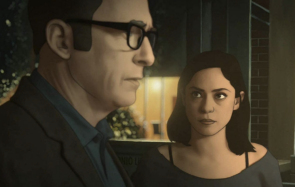“I lost another tooth!” my 8-year-old daughter shrieked as she ran towards me with the little bloody specimen. I pretended not to gag (I survived as a pre-med student for two semesters before dropping out, following a gruesome dissection lab involving a nasty rat). We carefully placed the tooth in a miniature plastic chest under her pillow.
“Try to fall asleep early tonight,” I whispered in her ear as I hugged her. “I hear the tooth fairy is very busy these days.”
We walked back into the kitchen and my daughter asked whether the tooth fairy visited me in Israel when I was growing up. I told her the truth. “We didn’t have a tooth fairy in Israel back then. But I’ve heard that now she is able to make it over the ocean and visit kids there, too.”
READ: No Tooth Fairy in This House–But That Doesn’t Stop People From Asking
Out of nowhere, my mom, who was quietly reading in the other room, piped up. “Yes we did have a tooth fairy back then! I distinctly remember putting money under your pillows.”
I was in shock. This was not an opportune time for Grandma’s selective memory to kick in. My mom has nothing against the tooth fairy, just as she has nothing against Santa. But raising us in 1970s Israel, these fabled figures were not part of our lives. Instinctively I wanted to explore the origins of the inaccurate recollection, but the situation called for immediate damage control. This was no time to debate family history—my daughter was already borderline histrionic as she processed this news flash.
“You mean…” That was all my daughter managed to say before she started to cry. My mother felt horrendous when she realized what had happened. She clearly did not mean to burst the tooth fairy bubble. It just sort of happened.
READ: Explaining the Tooth Fairy, God & Other Things We Cannot See
“No wonder the tooth fairy’s handwriting looked so familiar!” my daughter said between sobs. “You lied to me!”
Yes. Yes I did.
From the very first lost tooth, I had mixed feelings about perpetuating the tooth fairy myth. I made peace with the fact that she is part of elementary school culture and chose to partake in the charade. Not only did I participate—I went all out. Our tooth fairy was supportive and generous, leaving little mementos or cash gifts. She always included a heart-shaped note with an empowering and personal message (I just KNOW she used my computer paper and the red pen I used to mark up legal documents while I still worked from home). Her messages complimenting positive and kind behavior had a miraculous effect on my daughter…
Rationally, I can understand how my mom inadvertently spilled the beans. By the time my sister and much younger brother were losing teeth, we were no longer living in Israel. My mom was recalling the tooth fairy’s regular visits to our home in the U.S., forgetting that I was too old for the tooth fairy by the time we moved here.
READ: From the Tooth Fairy to the Truth Fairy
I attempted to explain to my daughter that grown-ups are human and make mistakes, too. But she was focused on my lie and the tooth fairy’s demise. While normally she relished my coming clean every time I said a bad word or made a mistake, she had no satisfaction from the explanations and apologies that followed the tooth fairy revelation.
I realized that she needed to mourn the death of a part of her innocence. This was a rite of passage that came abruptly and sooner than she was ready to accept. A small part of me wanted to dismiss the entire thing with, “Give me a break—it’s not that big a deal!” But it was.
Eventually my daughter was able to laugh at the incident and accept that stuff happens. She adores her Grandma and knows she didn’t mean to hurt her. Now at 14 years old, it’s just a war story in her arsenal of childhood memories.
But then it happened again.
“I lost my first toof and I did it in Israel!” my 6-year-old nephew announced at my daughter’s bat mitzvah luncheon in Jerusalem. Thanks to the hotel lobby gift shop and my sister’s quick thinking, my nephew woke up to find a little fuzzy camel near his pillow. My mom grinned as she congratulated him and leaned in to my daughter.
READ: Should I Play Along With My Daughter’s Imaginary Friend?
“Do you remember when I messed up and told you that mom was the tooth fairy?”
My 9-year-old niece was sitting next to my daughter. She must have supersonic hearing as I have yet to understand how she could’ve possibly heard anything over the noise in the restaurant. She immediately began to cry as my sister rushed her to the bathroom, not only to avoid a scene, but also to ensure that my 6-year-old nephew’s tooth fairy fantasy remained intact.
My daughter, a veteran victim of this particular faux pas, followed them into the hot and cramped bathroom to comfort her cousin. Her advice? “It’s OK to be upset. Just know that Grandma didn’t mean for you to find out this way. You would’ve soon found out the truth about the tooth fairy anyway—at least we’re here together.” Not bad advice from a 12-year-old who has been there and done that.
For me, depending upon the day, this story falls somewhere between no big deal and ruining a childhood fantasy. But the bigger lesson is that adults make mistakes and helping our children forgive and accept people is the goal. My mom is a beloved Grandma. Her six grandchildren adore her company and revel in her antics. Her sense of humor, craziness, and deep connection with each of them is the glue that binds. My daughter accepts that no one is perfect and that our imperfections make us more lovable, human, and real.
But Grandma is forever banned from even uttering the words “tooth fairy” while she still has younger grandchildren who believe.







